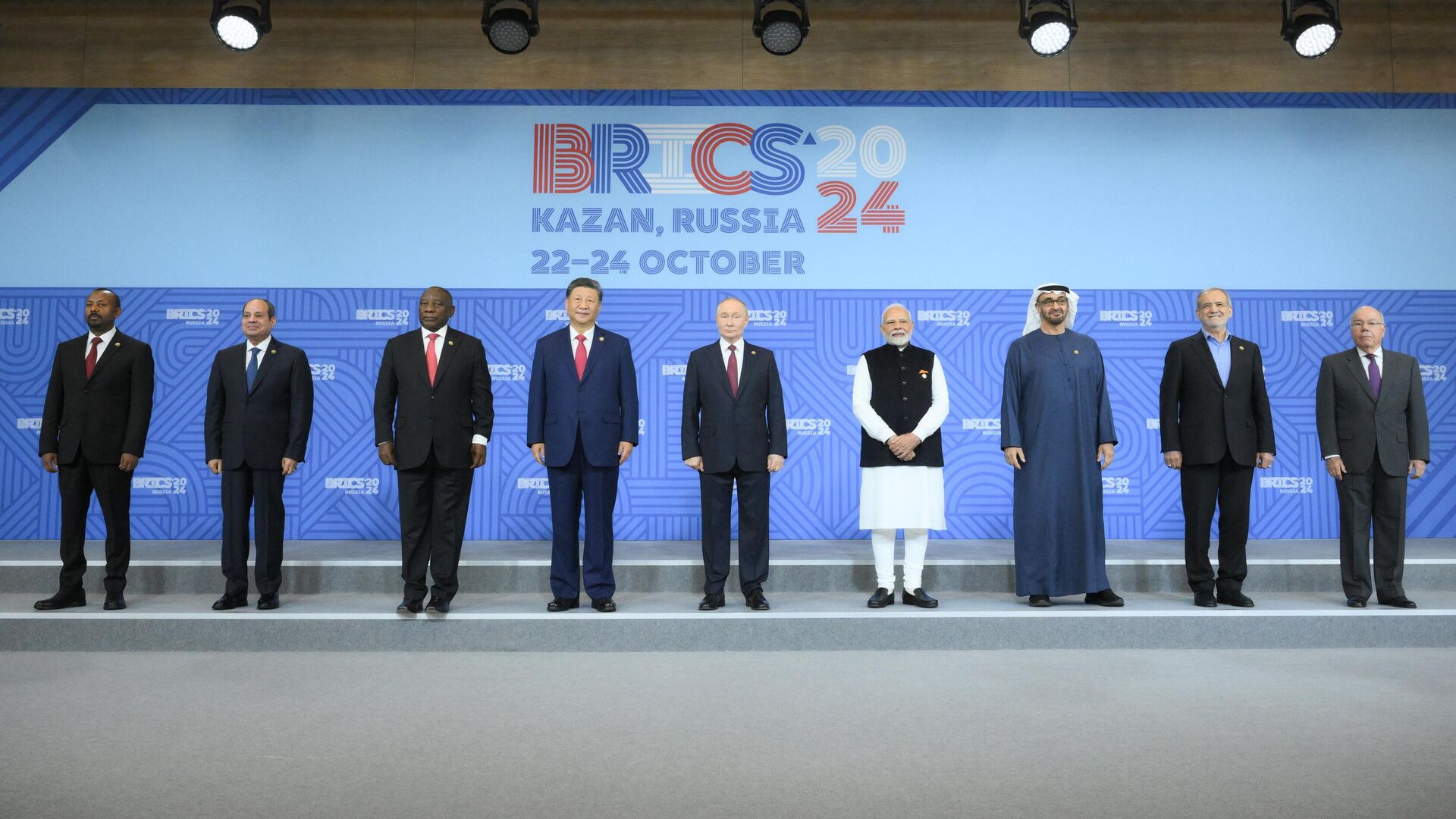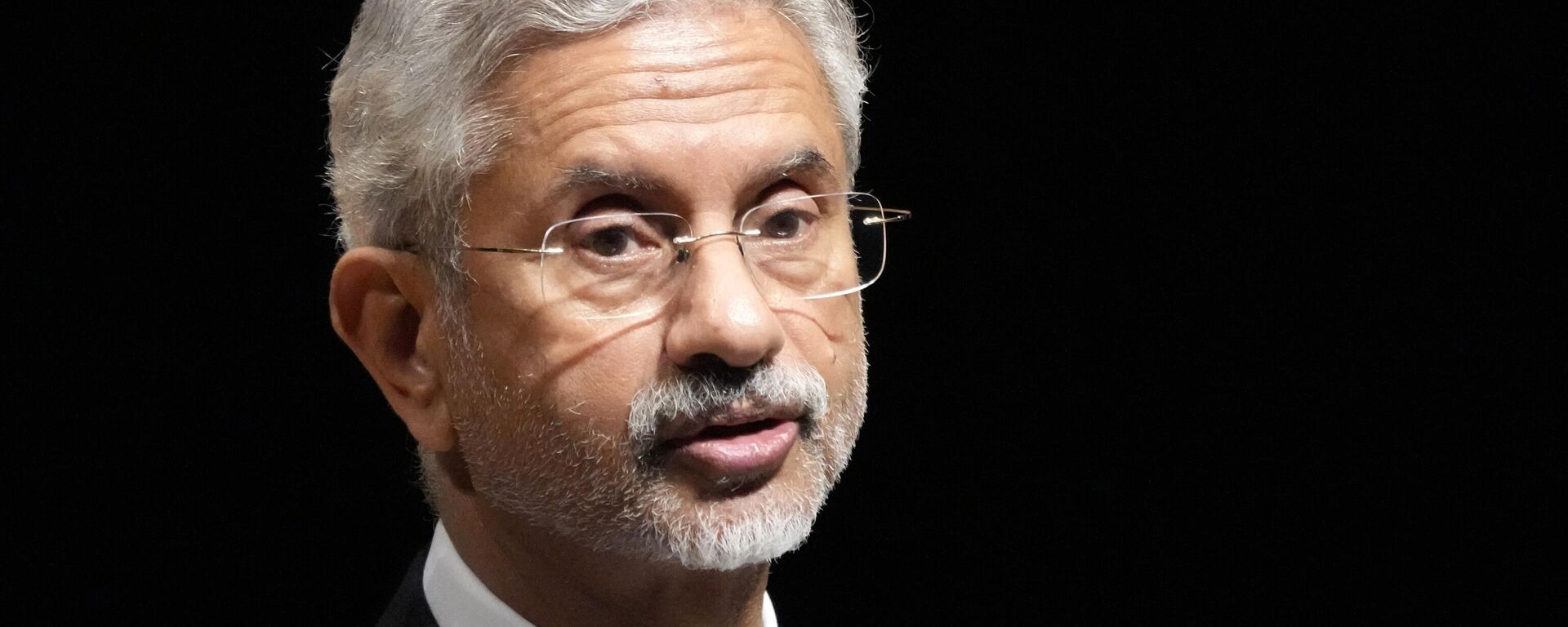https://sputniknews.in/20250328/brics-isnt-anti-us-it-seeks-geopolitical-balance-founder-8915993.html
BRICS Isn't Anti-US, It Seeks Geopolitical Balance: Founder
BRICS Isn't Anti-US, It Seeks Geopolitical Balance: Founder
Sputnik India
The 10th BRICS Policy Planning Dialogue in Brasilia this week was attended by delegations from 11 member countries, including Indonesia, which became a formal member this year. Internal BRICS cooperation was a key focal area.
2025-03-28T13:25+0530
2025-03-28T13:25+0530
2025-03-28T13:25+0530
world news
brazil
indonesia
global south
ministry of external affairs (mea)
brics
india
global economy
economics
rising economies
https://cdn1.img.sputniknews.in/img/07e8/0a/17/8312538_0:172:3327:2043_1920x0_80_0_0_d651780774fc9617c90465e45897fd16.jpg
Ambassador Celso Amorim, a special advisor to the Presidency of Brazil for International Affairs and one of the founders of BRICS, told the BRICS Policy Planning Dialogue Meeting in Brasilia this week that the grouping wasn't anti-US or anti-West, but aspired to create a "geopolitical balance".The Brazilian chair said that the recent expansion of the grouping from five to 11 countries added a layer of "complexity," but was essential for advancing the interests of the Global South. He also stated that BRICS continued to strengthen its role as a "bridge between the Global South and emerging economies.""Africa and the Arab world needed representation; Indonesia, whose population is larger than Brazil, also needed it," Amorim said.A transcript of Amorim's remarks was released on Friday.The Brazilian chair has an "intense agenda" for the 11 BRICS member countries this year, including a planned National Security Advisors (NSA)-level meeting in coming months, he said.Further, the Brazilian presidency highlighted the BRICS Policy Planning Dialogue's role in strengthening relations among member countries and reflecting on the future of global governance.The Dialogue is distinguished by its comprehensive format, allowing foreign policy planning officials from member countries to engage in discussions on relevant topics without the pressure of producing a final document.Internal BRICS cooperation was essential to ensure that the grouping continued to plan an important role in "shaping global governance and promoting a more balanced international order", Ambassador Sérgio Rodrigues do Santos, who heads Brazil's Political Planning Office, told the meeting.Rodrigues also clarified to participants that BRICS did not have a "mandate to negotiate common positions or joint statements."A readout issued by India's Ministry of External Affairs (MEA) this week stated that the meeting provided an opportunity to discuss the "institutional development" of BRICS.
https://sputniknews.in/20250322/brics-expansion-reflects-its-status-and-importance-jaishankar--8890745.html
brazil
indonesia
global south
india
asean
Sputnik India
feedback.hindi@sputniknews.com
+74956456601
MIA „Rossiya Segodnya“
2025
Dhairya Maheshwari
https://cdn1.img.sputniknews.in/img/07e6/0c/13/138962_0:0:641:640_100x100_80_0_0_2cb44360dbcdf6d84bf4b299cd045917.jpg
Dhairya Maheshwari
https://cdn1.img.sputniknews.in/img/07e6/0c/13/138962_0:0:641:640_100x100_80_0_0_2cb44360dbcdf6d84bf4b299cd045917.jpg
News
en_IN
Sputnik India
feedback.hindi@sputniknews.com
+74956456601
MIA „Rossiya Segodnya“
Sputnik India
feedback.hindi@sputniknews.com
+74956456601
MIA „Rossiya Segodnya“
Dhairya Maheshwari
https://cdn1.img.sputniknews.in/img/07e6/0c/13/138962_0:0:641:640_100x100_80_0_0_2cb44360dbcdf6d84bf4b299cd045917.jpg
brics indonesia, brics brazil, brics summit, trump brics, trump news, trump tariffs, trump dedollarisation, brics dedollarisation, brics news, jaishankar brics, brics tariffs, brics global south
brics indonesia, brics brazil, brics summit, trump brics, trump news, trump tariffs, trump dedollarisation, brics dedollarisation, brics news, jaishankar brics, brics tariffs, brics global south
BRICS Isn't Anti-US, It Seeks Geopolitical Balance: Founder
The 10th BRICS Policy Planning Dialogue in Brasilia this week saw delegations from 11 member countries, including new member Indonesia. Internal BRICS cooperation was a key focus, according to an official readout.
Ambassador Celso Amorim, a special advisor to the Presidency of Brazil for International Affairs and one of the founders of BRICS, told the BRICS Policy Planning Dialogue Meeting in Brasilia this week that the grouping wasn't anti-US or anti-West, but aspired to create a "geopolitical balance".
"We are not 'anti', we are pro-development, pro-multilateralism and pro-social justice", remarked the Brazilian presidential advisor, who chaired the meeting.
Tracing the origins of the BRICS grouping, Amorim recalled that it was born out of "convergence of interests" and has come to represent a "geopolitical counterweight".
The Brazilian chair said that the recent expansion of the grouping from five to 11 countries added a layer of "complexity," but was essential for advancing the interests of the Global South.
He also stated that BRICS continued to strengthen its role as a "bridge between the Global South and emerging economies."
"Africa and the Arab world needed representation; Indonesia, whose population is larger than Brazil, also needed it," Amorim said. A transcript of Amorim's remarks was released on Friday.
Speaking about the "crisis" facing US-led multilateralism, Celso Amorim said that BRICS offered an "alternative", as the grouping continues to work towards a "more inclusive and fair world order" in line with the needs of an increasingly multipolar world.
The Brazilian chair has an "intense agenda" for the 11 BRICS member countries this year, including a planned National Security Advisors (NSA)-level meeting in coming months, he said.
"Brazil has already made history in BRICS, and the group will make history in the international order," he said.
Further, the Brazilian presidency highlighted the BRICS Policy Planning Dialogue's role in strengthening relations among member countries and reflecting on the future of global governance.
The Dialogue is distinguished by its comprehensive format, allowing foreign policy planning officials from member countries to engage in discussions on relevant topics without the pressure of producing a final document.
"It is not a forum for formal decisions, but rather a place for the exchange of views, in which it is possible to reflect on the most current issues and challenges that shape the future of the international system and of BRICS itself," it stated.
Internal BRICS cooperation was essential to ensure that the grouping continued to plan an important role in "
shaping global governance and promoting a more balanced international order",
Ambassador Sérgio Rodrigues do Santos, who heads Brazil's Political Planning Office, told the meeting.
Rodrigues also clarified to participants that BRICS did not have a "mandate to negotiate common positions or joint statements."
"Our role here is to exchange mutual assessments of the international system. The information discussed is taken to each Ministry of Foreign Affairs and serves to support analyses that support the implementation of each country's foreign policy," the Brazilian chair said.
A readout issued by India's Ministry of External Affairs (MEA) this week stated that the meeting provided an opportunity to discuss the "institutional development" of BRICS.
"Key development priorities, including global health cooperation, the evolving international trade and financial scenario, climate action, artificial intelligence governance, and reforms of multilateral peace and security frameworks were also discussed," the Indian readout informed.



